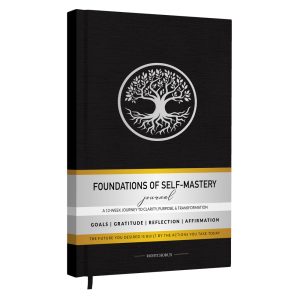Growth mindset journal prompts are powerful tools that help reframe your perspective, build resilience, and ignite real transformation.
Right from the first entry, these thoughtfully crafted questions work beneath the surface—challenging fixed patterns of thought and replacing them with empowering ones.
Whether you’re navigating change, pursuing personal goals, or simply striving to better understand yourself, journaling with intention can be a gentle yet potent catalyst for growth.
In this post, we’ll explore how growth mindset journal prompts can guide your journey toward self-mastery.
You’ll learn how to overcome common emotional blocks, build sustainable habits, and craft routines that support personal development.
Plus, we’ll share how tools like the Foundations of Self-Discovery Mastery Journal offer the structure, prompts, and support needed to make meaningful change both achievable and enjoyable.
Foundations of Self Discovery & Mastery Journal: A 13-Week Personal Development Journal System
$29.95
The Foundations of Self Discovery…
Table of Contents
The Power of Growth Mindset Journal Prompts for Self-Transformation
When we shift our inner dialogue, we shift our outer results—and that’s the transformative magic behind growth mindset journal prompts.
A growth mindset believes intelligence, skill, and emotional strength can be developed with effort and learning. In contrast, a fixed mindset sees these traits as unchangeable.
This fundamental difference influences how we show up in the face of obstacles and opportunity alike.
In daily journaling, prompts that cultivate a growth mindset help reprogram beliefs and narratives that might otherwise limit us.
They encourage you to see setbacks as stepping-stones, changing your relationship with challenge and fueling resilience over time.
Why Growth Mindset Matters in Daily Journaling
Growth mindset shows up in how you speak to yourself and how you make sense of your experiences.
Engaging with journal prompts that focus on potential and process over perfection allows you to:
- Rewrite old narratives around failure or discomfort
- See learning as a win, not an inconvenience
- Approach personal goals with grit and flexibility
- Recognize effort as an essential part of mastery
For example, try prompts like: “What did I handle today that I wouldn’t have a year ago?” or “Where might a mistake today be showing me a path forward?” These reflections elevate struggle into meaning and meaning into growth.
Types of Prompts That Nurture Resilience
Certain prompts are specially designed to counteract limiting beliefs, elevate your mood, and unlock deeper emotional insight.
Some examples include:
- “What belief about myself am I ready to release?”
- “Where have I seen transformation take place in my life that I often forget?”
- “What progress have I made that I haven’t celebrated?”
- “How would I speak to a younger version of me today?”
Each of these questions nudges you lovingly toward possibility, helping you unearth emotional truths, internalize progress, and move forward with intention.
Foundations of Self-Discovery Mastery Journal: A Guided Approach
The Foundations of Self-Discovery Mastery Journal was developed precisely for those ready to deepen their reflective practice.
Built around a structured six-part journaling framework—Today’s Goal, Today’s Affirmation, Gratitude, What Went Well, What to Improve, Tomorrow’s Next Step—this evidenced-based layout tracks your emotional progress, inner lessons, and actionable insights.
More than a journal, it’s a personal-growth guide. It weaves together gratitude, purpose alignment, and shadow work to foster both clarity and consistent action.
With gentle quotes, affirmations, and model prompts built in, it’s ideal for shifting your mindset one empowering entry at a time.
Foundations of Self Discovery & Mastery Journal: A 13-Week Personal Development Journal System
$29.95
The Foundations of Self Discovery…
Journaling Techniques to Deepen Your Growth Mindset Practice

To get the most out of growth mindset journal prompts, how you write matters just as much as what you write.
Simple tweaks in language, setting, and ritual can shape your experience and help rooted habits flourish.
Think of journaling not just as an expressive outlet, but as a sacred daily encounter with your evolving self.
Use Intentional Language
The stories we tell ourselves become the architecture of our beliefs. That’s why framing matters.
When writing in your journal, try replacing static or negative statements with empowering, reflective phrasing:
- Instead of “I failed” → Try “I found a way that doesn’t work—what can I do differently?”
- Instead of “I’m not good at this” → Try “I’m learning something new, and growth takes practice.”
Use sentence starters like:
- “What I’m beginning to understand is…”
- “Today challenged me, and I learned…”
- “I’m proud of myself for the way I…”
- “Moving forward, I want to explore…”
This simple shift from judgment to curiosity transforms your experience of setbacks—and reinforces new, adaptive neural pathways over time.
Incorporate Daily Reflection Routines
Consistency is key when cultivating a growth mindset through journaling. Creating a daily ritual—whether in the morning to center your thoughts or in the evening to reflect—is foundational for sustainable transformation.
Here’s how to begin:
- Choose a time you’re least likely to be interrupted.
- Designate a specific place for your journaling practice.
- Use calming elements (soft lighting, warm tea, mindful music).
- Pre-select your prompt or use a guided tool like the Foundations of Self-Discovery Mastery Journal to get started.
With as little as 10–15 minutes a day, you’ll begin to notice new insights arise. Over time, this routine becomes not just habit—but healing.
Foundations of Self Discovery & Mastery Journal: A 13-Week Personal Development Journal System
$29.95
The Foundations of Self Discovery…
Common Emotional Blocks — and How Growth Mindset Prompts Can Help
Everyone faces emotional resistance. Whether it’s fear of failure, perfectionism, or inner comparison, these barriers can make journaling feel uncomfortable—just when the process stands to benefit you most.
The magic of growth mindset journal prompts is their ability to unlock self-compassion while helping you move forward from emotional blocks.
Fear of Failure
Fear of failure is deeply human—and deeply limiting. But when explored through journaling, it becomes a doorway to courage. Prompts like:
- “What does failure mean to me today?”
- “When was a time I failed and still moved forward?”
- “What growth became possible because of that failure?”
- “If I couldn’t fail, what would I try this week?”
…can help you meet that fear with awareness, not avoidance. These questions remind you that mistakes are a natural—even necessary—part of mastery and evolution, not evidence of deficiency.
Comparison and Self-Judgment
In today’s social media-driven world, comparing ourselves to others can feel constant. To quiet that noise, reflection is your refuge. Consider:
- “What makes me uniquely positioned for my path right now?”
- “What achievements have I brushed over or minimized?”
- “How would I speak if I were my own best advocate?”
- “What have I navigated that others never see?”
These perspectives bring you back to center. Over time, your inner voice becomes quieter, kinder, and more anchored in your own truth.
Foundations of Self Discovery & Mastery Journal: A 13-Week Personal Development Journal System
$29.95
The Foundations of Self Discovery…
Building Habits with Growth Mindset Journal Prompts

Creating a sustainable journaling habit isn’t about willpower—it’s about thoughtful habit design.
When growth mindset reflection becomes woven into your daily rhythm, your mindset shifts organically.
Incorporating intentional journaling into existing routines makes transformation feel effortless and enjoyable.
Start Small — and Keep It Consistent
Start with just one prompt a day. You can stack this habit alongside something you already do:
- Morning coffee → 5 minutes of journaling
- Evening wind-down → Reflect on what you learned
- Weekly planning → Review mindset wins/focus areas
- After therapy or coaching → Process insights through prompts
Don’t aim for perfection—just consistency. You’re creating a relationship with your inner self, one sentence at a time.
Track Your Personal Wins
Unlike to-do lists, growth mindset journaling tracks the wins most people miss:
- Emotional breakthroughs
- Shifts in self-talk and perspective
- Courageous conversations had
- New habits formed over time
The Foundations of Self-Discovery Mastery Journal offers dedicated sections for progress celebration, next-13-week planning, and a gratitude vision board—so you can see how far you’ve come and clarify where you’re headed.
Foundations of Self Discovery & Mastery Journal: A 13-Week Personal Development Journal System
$29.95
The Foundations of Self Discovery…
Creating Your Own Growth Mindset Journal Prompts
Sometimes the most powerful questions are the ones you write yourself.
Crafting your own growth mindset journal prompts strengthens self-awareness, empowers clarity, and ensures your journaling always speaks directly to your inner landscape.
How to Write Meaningful Questions
Start each prompt with an open-ended verb such as:
- “How…?”
- “What does it mean to…?”
- “Why did I react this way when…?”
- “Who am I when I face…?”
A great journal prompt invites exploration, not explanation. It leaves room for honesty and growth, not just answers. Pair your prompts with reflection-friendly language like:
- “I’m learning that…”
- “This reminded me of…”
- “I used to believe… but now I’m questioning…”
Reflection Categories to Explore
Growth mindset journaling doesn’t just improve your self-talk—it can touch every area of life. Use your custom prompts to reflect on:
- Relationships: “How am I learning to set healthier boundaries?”
- Work: “What recent challenge helped me grow professionally?”
- Inner Voice: “When was the last time I didn’t believe I was enough?”
- Dreams: “What would I do if self-doubt didn’t slow me down?”
The more diverse your prompts, the more dynamic your growth.
Foundations of Self Discovery & Mastery Journal: A 13-Week Personal Development Journal System
$29.95
The Foundations of Self Discovery…
Using Growth Mindset Journal Prompts to Support Mindfulness Practice

Mindfulness isn’t just a state of being—it’s a practice we return to, again and again.
Growth mindset journal prompts strengthen this process by anchoring attention, increasing emotional clarity, and gently revealing the stories we hold within.
Journal Before Meditation
Use journaling to transition into a meditation practice:
- “What do I want to release before I sit in stillness?”
- “What intention do I want to carry into this quiet space?”
- “What’s my breath trying to tell me today?”
- “What part of me needs compassion right now?”
This not only grounds your awareness but prepares your nervous system for deeper rest and introspection.
Mindful Re-Reading
Revisit your past journal entries with a compassionate lens. Ask:
- “What patterns or themes am I noticing?”
- “Where have I softened or grown since this entry?”
- “What emotional undercurrents were present then that I can better hold now?”
- “Is this belief still true for me?”
Over time, rereading affirms your progress and deepens gratitude for the journey.
Conclusion
Growth mindset journal prompts are more than writing exercises—they are windows into transformation.
By choosing to reflect daily, ask better questions, and shift inner narratives, you train your mind to not only see possibilities but act on them.
It’s in the consistent practice that clarity sharpens, emotional resilience deepens, and forward momentum builds.
And you don’t need to do it alone. Tools like the Foundations of Self-Discovery Mastery Journal offer a structured, proven path toward self-awareness and real change—anchored in routines, rituals, and intentional reflection.
Your next breakthrough could be just one prompt away. So grab your pen, take a deep breath—and begin.
Frequently Asked Questions
Growth mindset journal prompts are carefully crafted questions that help shift your mindset from fixed to flexible. They promote resilience, self-awareness, and intentional action by encouraging you to reframe challenges, celebrate progress, and explore emotional growth through reflective writing.
The best approach is daily, even if just a few minutes a day. But if that feels overwhelming, aim to journal three times a week. Journaling consistently, no matter the frequency, is more important than journaling perfectly.
Absolutely. Beginners thrive with guided support. The Foundations of Self-Discovery Mastery Journal is perfect for those just starting—it breaks down prompts, offers example responses, and maintains a gentle, motivating flow.
Morning entries help orient your day with intention. Evening entries support processing, clarity, and closure. Choose the time that feels most peaceful and sustainable for your current schedule.
Yes. You don’t need to write long entries to benefit. A few sincere sentences in response to a powerful question can spark meaningful insight. Guided formats like the Foundations of Self-Discovery Mastery Journal keep writing simple and focused.
You may notice more curiosity in hard moments, quicker recovery after setbacks, or increased positive self-talk. Look for small, internal wins—such as choosing self-compassion over self-blame—that indicate real change is happening.
Journal prompts act as an entry point to mindfulness by helping you process your thoughts before a mindfulness practice. They clear the mental noise and allow for deeper, more present sessions of meditation or breathwork.
A structured journal like the Foundations of Self-Discovery Mastery Journal offers curated prompts rooted in positive psychology and behavior science. This guidance turns each session into focused, outcome-driven reflection designed to generate measurable personal growth.
Yes—restarts are not failures, they are recommitments. Begin with one heartfelt prompt. Let guided tools like the Foundations of Self-Discovery Mastery Journal lift the pressure off and lead with compassion.
Even one quality prompt can be transformative. Answering 1–3 prompts gives you enough depth without feeling overwhelmed. Consistency and sincerity matter most—not quantity.







